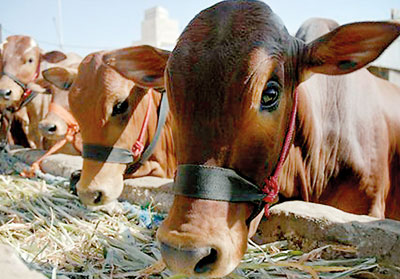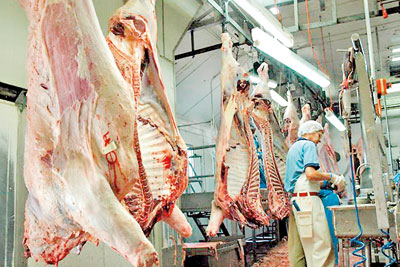Sunday Times 2
Slaughter of animals: Why ‘Halal’ meat is ‘Haram’
View(s):Point of view
By Professor Kym Fraser
I have a keen interest in other cultures, international business, and global affairs having visited over 100 countries, including Sri Lanka many times. As such I was keenly interested in the controversial issue ranging in Sri Lanka today. An organisation called the Bodu Bala Sena (BBS) has protested to the increasing intrusion of ‘halal’ into the daily activities of those that are non-Muslims, especially Buddhists.

Sacrificial cows are seen on sale at a market ahead of the Eid al-Adha feast in Sanaa, Yemen (Reuters)
The method and tactics of the BBS in getting its message across has been often viewed as extreme, and as a result has been depicted as ‘Buddhist rage’ in the Western media such as the BBC and Newsweek. Arguments range from the necessity (and cost) of labelling non-meats (such as Yogurt and Biscuits) as ‘halal’; to offering ‘halal’ labelled food to Buddhists monks at almsgivings. But the most controversial is the view that the slaughtering of meat to make it ‘halal’ is cruel and inhumane.
This last issue, if true, should be of concern to all decent people, which of course includes the majority of Muslims, Buddhists, Hindus, Christians, and even those that are ‘free thinkers’ like myself. Many of us eat meat, but do so with a hope that the meat we are eating has been slaughtered in the most humane way possible.
I have had Muslim students showing me ‘research articles’ that demonstrate that meat slaughtered by cutting the jugular vein is more humane than the electric-bolt shock used by Western slaughterhouses. One particular article referred to a study done by a Professor Schultz at Hanover University in Germany. Not only was the article not referenced in any academic journal, Professor Schultz does not appear to exist. This not to say, of course, that the cutting the jugular vein is any less humane than other means of slaughter.
Anyway, that is not the point of my article. It is not the final act of slaughter that is in question, but the entire process of ‘halal’ slaughtering that is taking place in many countries, especially in Indonesia where I often reside.
The Quran obviously does not prohibit the slaughtering of animals by electric-bolt shock, as such practices did not exist at the time The Quran was revealed. However, the tendency of Muslim law (the Shari’ah) is to try make the slaughter more humane by reducing the suffering of the animal. The Holy Prophet is reported to have said that if you must slaughter, slaughter in the best possible manner. “Sharpen your knife every time before you slaughter, but not in front of the animal to be slaughtered. The animal must not know it is going to be slaughtered. Do not slaughter an animal in the presence of other animals, and feed and rest the animal before slaughter”. The idea in Shari’ah is to stop cruelty to animals, so in that sense there is a common ground for decent people, both believers and non-believers of Islam.
But, unfortunately, this is not what is happening in most slaughtering houses today, both Muslim and non-Muslim. I have witnessed slaughterhouses in many Asian countries and the Middle-East in which animals are dragged in with legs broken, they can hear the sounds of other animals being slaughtered, and can see the dead carcasses hanging. In the mass slaughtering of chickens, they are hung next to each other by their feet, and rotated at high speed (to the sounds of religious prayer) across a guillotine, for their necks to be sliced. This is completely contrary to the Shari’ah requirement of not slaughtering an animal in the presence of other animals. Thus, clearly, such practices are not ‘halal’, but instead ‘haram’.
In fact, many Muslims speak about what they call ‘halal’ meat without even knowing the Quranic definition for this term! Muslims living peacefully in non-Muslim countries are often bombarded with the phrase “do not eat except the halal meat”. This has been especially so, after September 11, 2001. I have had Muslim colleagues in Australia who never before asked me if the beef and chicken I was serving was ‘halal’, now coming for dinner and asking such questions. Unfortunately, such questions in Sri Lanka, have resulted in the backlash that is the BBS.

A halal processing plant (AFP)
My question is “What do they really mean by ‘halal meat and how does their concept agree with the Quranic meaning of this term?
The Quran teaches that Allah is extremely displeased with those who prohibit anything that was not specifically prohibited in the Quran (16:116).
The upholding of any prohibitions not specifically mentioned in the Quran is tantamount to idolatry (6:148-150). Such prohibitions represent worshiping other God(s) beside Allah. Worshipping Allah Alone means upholding His Laws alone. Therefore, if something is prohibited only by man, and not in the Quran, then that man-made law itself is prohibited (haram).
The prohibited food and meat is detailed in 2:173, 5:3, 6:145 and 16:115. From these verses we have a clear account of what is ‘halal’ (lawful) and what is ‘haram’ (prohibited):
“He (Allah) only prohibits for you the eating of animals that die of themselves (without human interference), blood, the meat of pigs, and animals dedicated to other than Allah. If one is forced (to eat these), without being malicious or deliberate, he incurs no sin. Allah is Forgiver, Most Merciful.” 2:173
Allah knows that many Muslims will be living in the middle of Christians and Jews and will be sharing their food and for this reason Allah made it perfectly lawful for Muslims to eat the food of the people of the Scripture (Jews/Christians):
“Today, all good food is made lawful for you. The food of the people of the Scripture (Jews & Christians) is lawful (halal) for you ……” 5:5
The Quranic law is for all times and thus this concession that first applied when the Quran was first revealed, still applies today.
Moreover, Allah has also specified a very important criterion for His true believers with regards to food: Mention Allah’s name on everything you are going to eat. See 5:4, & 6:118-119:
“You shall eat from that upon which Allah’s name has been pronounced, if you truly believe in His revelation.” 6:118
Unfortunately Muslims today, because of their obsession with the method of slaughtering, i.e. buying and eating what they are told is ‘halal’ meat, are eating other food (e.g. fruit or vegetables) where they ignore Allah’s command to utter His name on it. Hence, since they have ignored Allah ‘s commands and followed man made innovations, they are in fact eating a lot of food that is unlawful according to the Quranic rules.
Sadly, it appears that Muslims scholars have substituted Allah’s condition for making food lawful (which is through uttering Allah’s name on it before eating it) by a new un-Quranic condition of their own making. Somehow they have made slaughtering the only lawful method of killing an animal for its meat. Needless to say, there is no such restriction in the Quran. As a result of this un-Quranic requirement, they insist that to make food ‘halal’ the name of Allah must be uttered on it before slaughtering it.
So how did this whole issue of the ‘halal’ method of slaughter come about?
Muslim scholars refer to 22:36 and say that since it includes a command to utter Allah’s name on animals before they are slaughtered, it provides support for the rule that without this pre-slaughter utterance the meat of the animal would not be ‘halal’. On first impression this may be a valid claim, but a closer look at 22:36 suggests otherwise. The following is a verification of this claim and an analysis of 22:36. The words in 22:36 are:
“The animal offerings are among the rites decreed by Allah for your own good. You shall mention Allah’s name on them while they are “sawaf” standing in line. Then once they are offered for sacrifice, you shall eat there from and feed the poor and the needy. This is why we subdued them for you, that you may show your appreciation.”22:36
The word “sawaf” means standing in line, or lined up (before being sacrificed).
However, this verse speaks about the ritual of animal sacrifice during hajj. The whole sura is called Hajj and if we start reading from verse 27 we would see that the subject is hajj and the rituals of hajj. What this means is that the rules given in these verses are applicable only to the time of hajj. During hajj, and while the animals are lined up, those performing hajj should commemorate the name of Allah on these animals. It should be noted that the command is to utter Allah’s name is while the animals are lined up, and not necessarily associated with the actual act of slaughtering. Slaughtering could happen immediately after or a number of hours later. Further proof to that is found in the words: “then once they are offered for sacrifice”, which indicates that the mentioning of Allah’s name is an independent act and not associated with the slaughtering itself, it is only associated to the time when the animals are being lined up.
It is also important to note that uttering Allah’s name on these animals during hajj has nothing to do with what makes meat ‘halal’. We see that this command (to utter Allah’s name) is not any different from the constant command from Allah for all those performing hajj to constantly utter and commemorate Allah’s name throughout hajj, and not only when the animals are being lined up.
This indicates that ‘halal’ meat as is understood these days is a term used more often for commercial profits than religious observances. Those who call their meat ‘halal’, are in some way insinuating that any other meat is not ‘halal’, or specifically that other meat sold by non-halal certified butchers or supermarkets, is not ‘halal’. But when we analyse the Quranic verses we find that these sellers are in fact deceiving the uninformed Muslims into believing that their meat is the only ‘halal’ meat for the Muslims.
The controversy highlighted by the Bodu Bala Sena (BBS) in Sri Lanka is an important one for Muslims worldwide; but for different reasons than those raised by the BBS. It is not so much the intrusion of ‘halal’ into the daily lives of non-Muslims, but instead the un-Quranic processes of slaughtering that is currently being marketed as ‘halal’. Correct this fundamental issue, and all other related issues will automatically resolve itself.
Muslims should study the Quran carefully to determine as to the definition of ‘halal’. If they still believe that food becomes ‘halal’ only by following a specific slaughtering process (which I have argued is not the case in the Quran); then as a minimum they should at least ensure that these so-called ‘halal’ butcheries are following the humane procedures that the Holy Prophet is reported to have said you must adhere to when slaughtering. Rather than charging money for certifying Yogurt and Biscuits as ‘halal’, Muslim groups should organise themselves to visit Halal slaughterhouses to ensure that the Holy Prophet’s wishes of humane slaughtering is being adhered to.
If not, the ‘halal’ meat they are eating is actually ‘haram’.
Follow @timesonlinelk
comments powered by Disqus




















